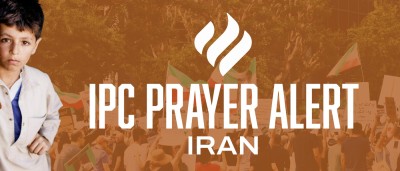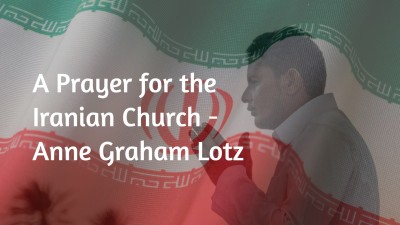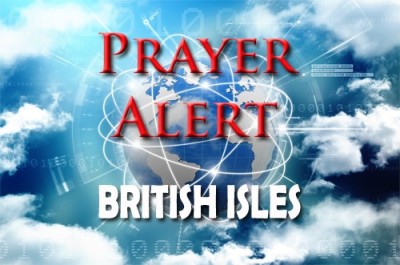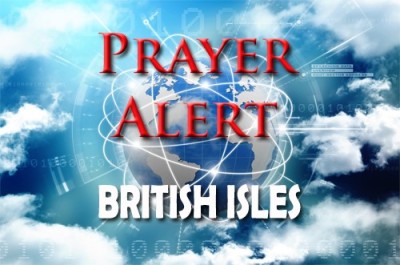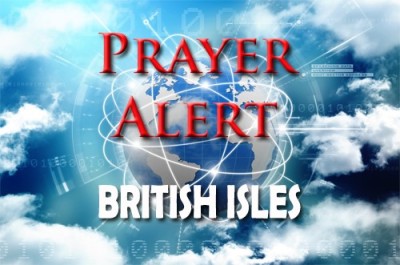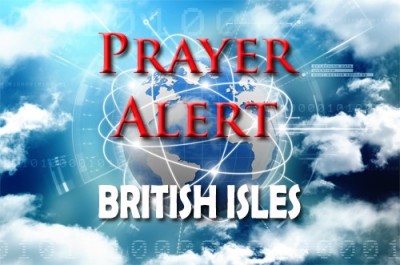IPC Prayer Alert – People and Church of Iran
At this critical moment, I would invite you to stand with us in prayer for the people of Iran and for the precious Church of Jesus Christ living and worshipping there.
Today, we ask you to lift your hearts to the Lord on behalf of Iranian families, communities, and believers who find themselves in an uncertain and fragile moment, facing fear, instability, and many unanswered questions about the days ahead.
 We are seeing reports of a severe escalation across the Middle East. Iran’s Supreme Leader, Ayatollah Ali Khamenei, has been killed, following coordinated U.S. – Israeli strikes on targets in and around Tehran. The strikes have triggered turmoil and uncertainty inside Iran as the nation faces a sudden leadership vacuum and an urgent succession process, while security forces and state institutions posture for control.
We are seeing reports of a severe escalation across the Middle East. Iran’s Supreme Leader, Ayatollah Ali Khamenei, has been killed, following coordinated U.S. – Israeli strikes on targets in and around Tehran. The strikes have triggered turmoil and uncertainty inside Iran as the nation faces a sudden leadership vacuum and an urgent succession process, while security forces and state institutions posture for control.
The conflict has widened beyond Iran and Israel. Reports indicate that Iran has launched retaliatory missile and drone attacks in response, with impacts felt across the region—including strikes or attempted strikes affecting U.S. forces and a number of U.S. allies in the Gulf and surrounding states, deepening fear of a broader regional war. International leaders and the United Nations have urged de-escalation. The situation remains fast-moving, with civilians across the region facing heightened risk and anxiety.
Prayers for ‘reign change’…
Let's pray for reign change—that the reign of Jesus Christ, the Prince of Peace, would advance in hearts, homes, and nations. We believe prayer changes things because it aligns us with the purposes of God, who alone rules with perfect justice, mercy, and truth.
Let’s be praying for:
- Safety of civilians in Iran, Israel, and surrounding Middle East nations
““He will cover you with His feathers, and under His wings you will find refuge.” (Psalm 91:4) - Freedom for the Iranian people and an end to oppressive rule
“He has sent Me to proclaim freedom for the captives and recovery of sight for the blind, to set at liberty those who are oppressed.” (Luke 4:18) - Open hearts for the Gospel and a great harvest of salvation among Iranians and neighboring nations
“The harvest is plentiful, but the laborers are few; therefore pray earnestly to the Lord of the harvest to send out laborers into His harvest.” (Matthew 9:37–38) - Wisdom and moral clarity for Prime Minister Benjamin Netanyahu, President Donald Trump, and governmental leaders across the Middle East
“I urge, then, first of all, that petitions, prayers, intercession and thanksgiving be made for all people — for kings and all those in authority, that we may live peaceful and quiet lives in all godliness and holiness. This is good, and pleases God our Savior, who wants all people to be saved and to come to a knowledge of the truth.” (1 Tim 2:1-4) - Righteousness to prevail in national life
“Righteousness exalts a nation, but sin is a reproach to any people.” (Proverbs 14:34) - The Church to minister with compassion, practical acts of kindness, and the love and truth of Jesus Christ amidst the casualties of war
“Let us not love in word or talk but in deed and in truth.” (1 John 3:18)
 In this context, we are deeply grateful for a timely and pastoral letter and prayer written by Anne Graham Lotz for the Iranian Church. Addressing believers “scattered throughout Iran,” she writes:
In this context, we are deeply grateful for a timely and pastoral letter and prayer written by Anne Graham Lotz for the Iranian Church. Addressing believers “scattered throughout Iran,” she writes:
“You, the Iranian Church in 2026, are in the hearts of God’s people all over the world. We know you are suffering in all kinds of trials.”
She reminds them—and us—of Jesus’ unshakable promise:
“Do not let your hearts be troubled… I am going there to prepare a place for you.” (John 14:1–3)
 Her words call the Church not to fear, but to persevere; not to retreat, but to trust the Lord who is both sovereign over history and intimately present with His people. The full letter and prayer can be read on the International Prayer Connect website HERE, and I strongly encourage you to take time to read and pray through it.
Her words call the Church not to fear, but to persevere; not to retreat, but to trust the Lord who is both sovereign over history and intimately present with His people. The full letter and prayer can be read on the International Prayer Connect website HERE, and I strongly encourage you to take time to read and pray through it.
Thank you for standing together with believers across the nations in this serious hour. As one united Church, we lift our eyes above the turmoil of the moment and fix them on Jesus, “the author and perfecter of our faith” (Hebrews 12:2).
May the Lord hear our prayers, strengthen His people, and advance His kingdom in Iran and throughout the Middle East.
Every blessing,
Dr Jason Hubbard - Director
International Prayer Connect
-----
Photo of Iranian believers is machine generated and is for illustrative purposes only. Any resemblance to persons living or past is entirely coincidental.
To God’s elect, scattered throughout Iran, who are beloved by God the Father, saved through faith in His only Son, our Lord Jesus Christ, and indwelt by the Holy Spirit.
Grace and peace to you in abundance.1
You, the Iranian Church in 2026, are in the hearts of God’s people all over the world. We know you are suffering in all kinds of trials. The cries of your hearts have echoed in ours as we claim these promises from God’s Word for you: …He will deliver the needy who cry out, the afflicted who have no one to help. He will take pity on the weak and the needy and save the needy from death. He will rescue them from oppression and violence, for precious is their blood in His sight.2 We know you have lost friends, family members, and neighbors in recent days. Heaven is keenly aware of their deaths as we cry out on your behalf.
As our cries reach Heaven’s throne, the following words of Jesus come to mind: Do not let your hearts be troubled. Trust in God, trust also in Me. In my Father’s house are many rooms; if it were not so, I would have told you. I am going there to prepare a place for you. And if I go and prepare a place for you, I will come back and take you to be with Me that you also may be where I am.3 Jesus is coming! He has opened Heaven for you! Your future is secure! And until the day you see His face, as you walk through the valley of the shadow of death, He is with you! He is for you! And in the end, He will bring you through to dwell in His heavenly Home forever! 4
This is His promise: So do not fear, for I am with you; do not be dismayed, for I am your God. I will strengthen you and help you; I will uphold you with My righteous right hand.5
This is a testing time for you…and a trusting time. His Word tells us that the testing of your faith develops perseverance. Perseverance must finish its work so that you may be mature and complete, not lacking anything,6 as you grow spiritually into the fullness of the character of Jesus Christ.7
Why were you born in this generation? Why specifically were you placed in Iran? Could it be that you are there for such a time as this? Does God want to use you to proclaim the good news that He loves Iranians, and that He offers them a personal relationship with Himself through faith in His only Son, Jesus Christ? Would you tell them:
- If they confess they are sinners and have done wrong things
- Be willing to turn away from their sin
- Believe that the death of Jesus Christ makes atonement for their sin
- Ask Him for forgiveness
- Believe in their heart that God has raised Him from the dead
- Ask Him to give them eternal life
- Invite Him to come live within them in the person of the Holy Spirit,
- Surrender their lives to Him as their Savior and Lord8
- Then commit to follow Him one step at a time, all the way to Heaven!
They can be saved! Saved from God’s judgement to be born again into God’s family! Could it be that the troubles you are experiencing are the means God will use to ignite revival fire through your witness in Iran? Let it be so!
Therefore, we urge you to not throw away your confidence; it will be richly rewarded. You need to persevere…For in just a very little while, He who is coming will come and not delay. But My righteous one will live by faith. And if he shrinks back, I will not be pleased with him. But you are not of those who shrink back and are destroyed, but of those who believe and are saved.9
For this reason, we bow our knees in prayer on your behalf…
God in Heaven. Father of our Lord Jesus Christ. You are the Eternal I AM. The One who is age to age the same. There is no shadow of turning with You. You are fully present in every generation—past, present, and future. National boundaries are no hindrance to You. They cannot bind You in nor keep You out. You go where You choose. You stride the winds of the earth. The clouds are the dust of Your feet. You are the All-Mighty. Your power has not been deleted or depleted over the millennia of human history. We know that You so loved the world that You gave us Heaven’s treasure when You sent Your only Son to die, so that anyone and everyone who places their faith in Him will not perish but have everlasting life.10
In this present worldwide climate of unbridled evil, we are desperate! Nations are unraveling. Wars are raging. There are rumors of more wars breaking out.
Kingdom is rising against kingdom. The innocent are dying. Our lives are at risk. Our young are losing hope. Our spirits feel the turmoil and agitation that surely is a reflection of the warfare being waged in the invisible realms. We need You!
For everything!
We look to You. You alone are the One who makes us to dwell in safety. You alone are the One who makes us secure. You alone are God. And You alone are our God. We turn to You, boldly confident of access into Your most Holy presence through the blood of Your Son and our Savior, the Lord Jesus Christ.11 You alone are The LORD. No one is higher than You. No one is greater than You. Again and again, You have been the salvation of Your people. You alone are able to shatter our enemies. In the greatness of Your majestic power, You overthrow those who come against You. We now call on You to rise up and be all that You are to Your followers in Iran.
We acknowledge that You are big enough to save each one, yet You are small enough to live in our hearts and manage the details of our lives. You are our hiding place. You are our refuge and our fortress. Your faithfulness is our shield. Your love is our comfort and our security. Your promises are our hope.
We praise You as One who has made Himself available night and day. You are attentive to the cries of Your children…right now! So, dear God, we humbly, boldly cry out to You on behalf of the Iranian Church. We pray that you would strengthen Your people with all power according to Your glorious might so that they may have great endurance and patience…You have rescued them from the dominion of darkness and brought them into the kingdom of the Son He loves, in whom they have redemption and the forgiveness of sins. 12
You are a prayer-hearing, prayer-answering, miracle-working, covenant-keeping God. Our eyes are on You. We run to You. We cling to You. We humbly ask You to defend, guard, protect, keep, comfort and bless the Iranian Church. Heal the brokenhearted and bind up their wounds.13 And during these days of oppression and persecution, we boldly ask that You would multiply the church. Pour out Your Spirit in revival power! Give your people boldness to share with others the hope that is within them…hope that is found in a personal relationship with You through saving faith in the Lord Jesus Christ. Don’t let Your followers be ashamed to testify about You because they know whom they have believed, and are convinced that He is able to guard what they have entrusted to Him for that day.14
For the glory of Your great name…Jesus, Amen
Please be assured, dear Iranian brothers and sisters, that we will continue to carry you in our hearts and on our knees until God answers our prayers.
Now to Him who is able to keep you from falling and to present you before His glorious presence without fault and with great joy—to the only God our Savior be glory majesty, power and authority, through Jesus Christ our Lord before all ages, now and forevermore!15
May the love of God the Father, the grace of our Lord Jesus Christ, and the fellowship of His Holy Spirit be with you all. 16

About Anne Graham Lotz
Anne Graham Lotz (born May 21, 1948) is an American evangelical author, Bible teacher, and global speaker. She is the second daughter of famed evangelist Billy Graham and Ruth Graham and is widely known for founding AnGeL Ministries, a nonprofit devoted to bringing God’s Word to life for believers around the world. (Wikipedia)
Called “one of the most influential evangelists of her generation,” Anne’s Just Give Me Jesus revivals have drawn large crowds internationally, and she has written numerous best-selling books encouraging deeper faith and Scripture engagement. (Anne Graham Lotz - Angel Ministries)
She and her late husband, Danny Lotz, had three children and three grandchildren, and her teaching continues to inspire Christians to grow in their relationship with Jesus.
Copyright © 2021 Anne Graham Lotz (AnGeL Ministries) Raleigh, North Carolina, USA. Used by permission. All rights reserved www.annegrahamlotz.org.
-----
1 1 Peter1:1-2
2 Psalm 72:12-14
3 John 14:1-3
4 Psalm 23:4, 6
5 Isaiah 41:10
6 James 5:3-4
7 Ephesians 4:13
8 Romans 3:23, 6:23, Acts 3:19, I John 1:9, 10:8-10, John 1:12, Revelation 3:20
9 Hebrews 10:35-39
10 John 3:16
11 Hebrews 10:19
12 Colossians 1:11, 13
13 Psalm 147:3
14 2 Timothy 1:8, 12
15 Jude 24-25
16 2 Corinthians 13:14
Christian nurse Jennifer Melle has returned to work after more than ten months of suspension following an incident involving a transgender prisoner. She was disciplined after referring to the patient as ‘mister’ while speaking with colleagues, despite reporting that she had faced racial abuse and physical threats during the encounter. Although her NHS trust has confirmed it will take no further action, she remains under investigation by the Nursing and Midwifery Council over the language used and for speaking publicly about her treatment. Melle, a south London nurse with twelve years of service, is pursuing an employment tribunal, alleging harassment, discrimination and breaches of freedom of belief. She has expressed gratitude for support received throughout the ordeal, especially by the Christian Legal Centre.
Ngoc*, a 63-year-old believer in Vietnam, has endured severe persecution for her Christian faith. Raised in ancestral worship, she came to faith in Jesus after hearing about His love and forgiveness at a local church. When she told her husband, his violence intensified, including attempts to strangle and stone her. Though some of her children opposed her decision, one daughter stood by her. Local authorities and neighbours later pressured Ngoc to renounce her faith. When she refused, a mob forced her from her home, and she was expelled from her village with only the clothes she wore. With her daughter and granddaughter, she found refuge in another community where local Christians helped them rebuild their lives. Despite suffering rejection, violence and loss, Ngoc continues to express deep trust in God, testifying to His faithfulness through hardship. (*name changed for security reasons)
On 23 February, Lord Mandelson was arrested at his London home on charges of misconduct in public office and later released on bail pending further investigation. His lawyers said the arrest was made due to claims that he might leave the country, but described them as ‘baseless’. The Metropolitan Police declined to comment. The investigation relates to allegations that, while serving as a minister, he shared market-sensitive government information with the late convicted offender Jeffrey Epstein. Officers executed search warrants at properties in Wiltshire and Camden before questioning him for nine hours. Lord Mandelson, who has always maintained that he has acted lawfully and done nothing wrong, says he is cooperating fully. Meanwhile, the police have finished searching the properties belonging to Andrew Mountbatten-Windsor, who was arrested on similar charges on 19 February. He has also been released on bail.
More than twenty Labour MPs have called for reform of England’s student loan system. Leading a parliamentary debate, Jas Athwal argued the system is unfair, with many graduates seeing balances rise despite regular repayments. Under current arrangements, Plan 2 borrowers pay interest linked to RPI inflation plus up to 3%, depending on earnings. From April 2027, the salary threshold triggering repayments will be frozen for three years, a move critics say effectively increases the burden during a cost-of-living crisis. Some MPs described the terms as retrospective and punitive, while others backed scrapping tuition fees entirely. Kemi Badenoch also urged lower interest rates, and the Conservatives have also said they would close 100,000 university places to alleviate debt and fund apprenticeships instead, arguing that some degrees were leaving graduates worse off. Keir Starmer acknowledged concerns and said the government would consider ways to make the system fairer.
Parents in England may soon face limits on choosing special schools for their children under sweeping reforms to special educational needs and disabilities provision. The white paper proposes that councils provide families with a shortlist of suitable placements, considering parental preference alongside value for money and the needs of all children in the area. Ministers say the changes aim to place more pupils closer to home, reducing long travel times and rising transport costs (now up to £3.4 billion a year). £4 billion has been pledged to expand specialist places within mainstream schools and reduce reliance on expensive independent providers. Private placements can cost more than twice as much as state-sector options, adding pressure to local authority budgets. While parents will retain the right to appeal decisions, tribunals will no longer be able to name a specific school. Broader reforms also include reviewing the future use of care plans.
Reform UK has suspended a campaign figure in the Gorton and Denton by-election, which they hope to win, after reported social media posts containing racist and misogynistic remarks. Adam Mitula, said to be involved in candidate Matt Goodwin’s campaign, allegedly questioned the scale of the Holocaust and made offensive comments about Jewish women and transgender people. He claimed that the posts were taken out of context, and angrily defended his reputation. Reform UK declined to comment on internal disciplinary matters. Labour’s deputy leader Lucy Powell urged Goodwin to distance himself from the remarks, warning that failure to do so would suggest tolerance of such views. The controversy comes during a closely watched contest in which Goodwin has positioned the vote as a challenge to Keir Starmer, focusing his campaign on borders, crime and cultural issues. Update: the Green Party won the by-election with a large majority. See
